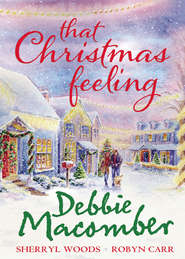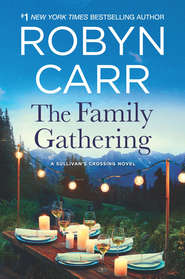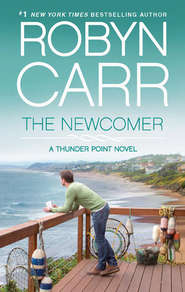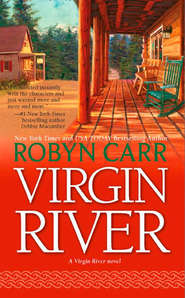По всем вопросам обращайтесь на: info@litportal.ru
(©) 2003-2024.
✖
The Wanderer
Автор
Год написания книги
2019
Настройки чтения
Размер шрифта
Высота строк
Поля
Rawley lived in a little inland town called Elmore. Mac gave Cooper directions to his place. Besides a gas station, post office, elementary school and Dairy Queen, Elmore wasn’t much of a town. The larger town of Bandon wasn’t far away and possibly served the small population’s needs.
The house was a small, old, brick structure with a porch. That classic pickup was parked on the side, identifying the place as belonging to Rawley. The yard was well kept and the grass still green, though the trees and shrubs were showing signs of fall with either color or brown. When Cooper knocked on the door and Rawley answered, the last thing he expected was the homey, clean, orderly house he saw inside.
“Hey. Got a minute?” Cooper asked.
Rawley gave his version of a nod, which was a smirk and a tilt of his head, stepping back so Cooper could enter. Inside was a living room and dining room that looked like a woman had left it behind—lace covers on the worn arms of chairs and sofa, pictures of farm scenes on the walls, a buffet with a couple of good glass bowls on top of a fabric runner, candlesticks on the table. All old, all maintained. In front of the fire sat an elderly man in a wheelchair. He was dressed in overalls and a long-sleeved shirt—clean—and on his feet were socks only. No point in shoes if you never walked.
“Very nice, Rawley,” Cooper said, taking it in. “That your dad?”
Rawley nodded.
Cooper had never been a patient man, but this was really stretching what patience he had very thin. “I wish you’d talk,” he said. “Unless you’re mute.”
“I’ll talk when I got something to say,” he said.
“Well, there,” Cooper said. “You doing okay since Ben’s death?”
“Not hardly,” Rawley said.
Well, there you go again, Cooper thought. Honest, if not informative. “Anything you need that I can get for you, now that he’s gone?”
“Can’t think what,” Rawley said.
At that statement, the old man turned his chair around to face Cooper. He didn’t exactly hold his head up, and Cooper could see that he was very likely a stroke victim. He turned the chair with his left arm, the right kinked in protectively at his side, and the right side of his face—mouth and eye—sagged.
“You looking for work?” Cooper asked.
“Hadn’t been. Why? You gonna open up Ben’s place?”
“No, but I’m cleaning it up and clearing it out. It’s got troubles—rot and mold and dead fish. Tomorrow a crew is coming out to clean out and remove the fish tanks, rotten food, trash...”
“Police locked it up and wouldn’t let me in,” Rawley said by way of explanation.
“I know. And the electric company turned off the power,” Cooper said. “The result is a stink and mess. But once they get the place so I can breathe in there, I have to go through his things. You know—pitch, give away, sell, whatever. There might be some things in there you want. If you help out, I can pay you what Ben paid you.”
Rawley grinned and showed off a stunning set of dentures. “He paid me a ton.”
“Gimme a break, Ben didn’t have shit. And he couldn’t tolerate a lie, either.”
“Eight dollars an hour,” Rawley said. “When?”
“In three days, I guess. Your dad okay alone if you work?”
The old man inhaled sharply and briefly lifted his head. It looked like he scowled, but with the uneven features, it was hard to tell. His good eye narrowed.
“He’s okay. If I work, the neighbor checks on him twice a day. I leave him fixed up for what he needs.”
“Okay, then. If you’re interested.”
Rawley gave a nod. No questions, no suggestions, no commentary.
“Rawley, I don’t know what I’m going to do with the place. Fair warning. This could be a week of work and that’s all. I might just tear the place down and sell the land.”
“You’ll figure it out,” Rawley said, apparently unconcerned.
“Yeah, I guess.” Cooper scratched his neck. “See you then.” He turned to leave.
“Hold on,” Rawley said. He went into the kitchen, which was just through the dining room arch, then came back with a package. Cookies, wrapped in Saran, no plate, no ziplock bag. “Can’t be much around that toy hauler for snacks. They’re sugar-free, on account of Dad.”
“Right,” Cooper said, accepting them. “Thanks. That’s real nice.”
Rawley just shrugged.
Cooper left with yet another mystery about Ben. Rawley lived in a house that was well cared for, yet Ben’s place was mostly a wreck. How did that add up? Did Rawley take care of himself, but do a sad job for Ben?
Once in his truck, Cooper tried a cookie. Not bad, for sugar-free. Soft and tasty. He just shook his head.
* * *
Three days later, the smell wasn’t too bad and Cooper could get inside Ben’s place without choking. He had the electricity turned on; it not only offered functional lighting in the shop, but he ran an extension to the trailer to save on his generator. Just having a crew there to take out garbage and install fans brought attention to the place, and when the weather was decent, people who were out on the beach felt a need to wander closer, to find Cooper on the deck or the dock. Usually they would stop to say hello or hang out for a while, to ask what was going on. A kayaker rowed up to the dock, got out and asked what was going to happen to the place now.
“I don’t exactly know,” he said honestly. “I guess I’m responsible for it, but I’m not interested in running a business.”
“Neither was Ben,” the guy said, laughing. “But people around Thunder Point liked the place, even if we didn’t want to go inside too much.”
“What did you like it for?” Cooper asked.
“Gossip and drinks, mainly. And Ben used to pick up his deli food every couple of days from Carrie—when he couldn’t talk her into delivering. She’d do that if her daughter was free to mind the deli. That’s good stuff, Carrie’s stuff, and Ben never even marked it up. He had egg sandwich kind of things for the morning, sandwiches and pizza for later, desserts and stuff. It was good. It was all wrapped—he didn’t cook it. Know what I mean?”
“All I saw in there was a microwave and a stove and oven that looked...” He didn’t want to say ancient, but although the kitchen was spotless, the appliances didn’t look very reliable. The bar, though small, was neat and well stocked. The glasses, though dusty, looked as if they’d been washed, not that he’d trust them.
A man and woman with a dog saw him on the dock and said, “You’re the new guy, right?”
“I guess I am.”
“I’m Charlie and this here’s Donna, the wife. So, when you gonna open up?”
“Don’t know that I will,” Cooper said. “For now I’m just cleaning the place up. I’m not much of a cook...”
“Ben didn’t really cook. He warmed.”
“Did Ben live on egg sandwiches and deli stuff?” Cooper asked.
“I don’t know,” Charlie said. “He was good with drinks. All drinks. Coffee, cappuccino, wine, beer and liquor. If the day was nice, I’d end up here with a bunch of guys from town for a drink or two. Sport fishermen came here for a few before taking their boats over to the marina.”
“What about Cliffhanger’s? Or Waylan’s?”
“Cliffhanger’s is expensive and Waylan’s is a shit hole. But they have HD TV. The owner is trying to make it a sports bar. If you open up, get a TV.”













